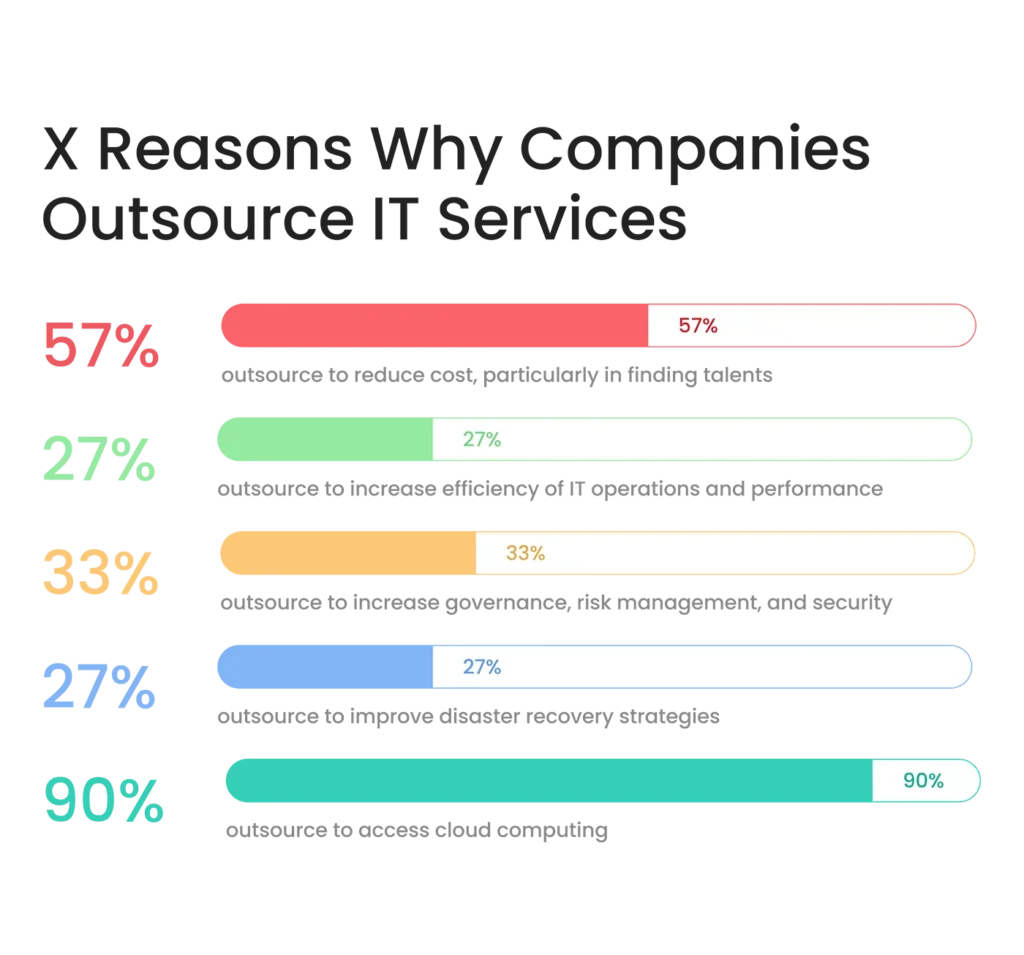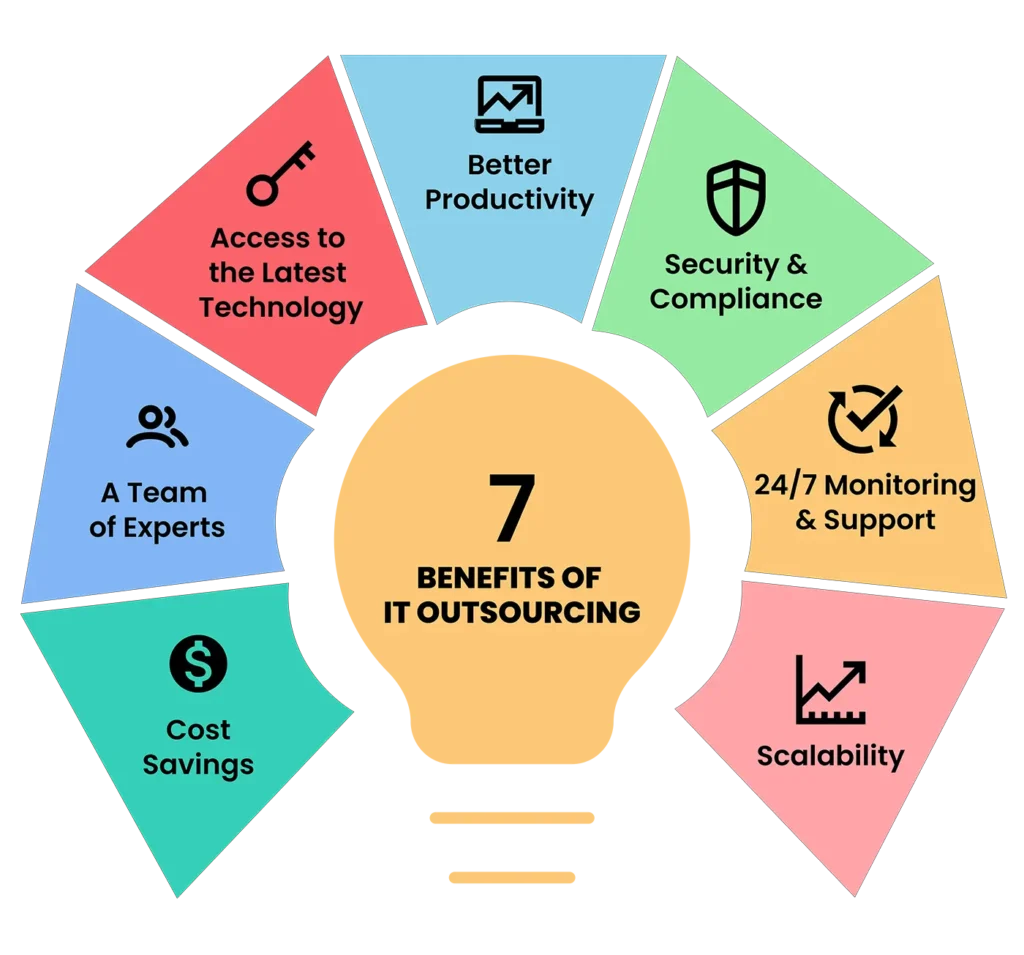More and more UK companies are finding outsourcing IT services to be a beneficial business operational strategy. They can solve the issue of finding talent with the necessary IT skills (which 76% of employers face) and save money on maintaining office spaces and equipment, as the team works remotely.
This led to the massive growth of the global IT outsourcing market, with a projected revenue of USD 618.13 billion in 2025. It’s also forecasted to reach USD 732.38 billion by 2030, with a CAGR of 3.45% in that period.
Now, let’s discuss IT outsourcing, the benefits it can bring to your business, and more.
What Is Outsourcing IT Services About?
An outsourcing IT service is simply trusting a third-party service provider like Archipelago BPO to manage and fulfil your IT-related functions. It allows you access to expert talent and advanced infrastructure 24/7, thereby significantly reducing your staffing and operational costs.
You have the option to have your IT tasks completely outsourced or have them co-managed by your in-house and outsourced teams. But regardless of your choice, your third-party service provider will carry out the IT services you contracted them with and provide on-demand support.
Why Companies Outsource IT Services

There are compelling reasons why 92% of G2000 companies are outsourcing IT services. As someone considering doing the same for your business, you probably thought one or two of these reasons:
- You want to reduce the investment in maintaining the IT infrastructure and the labour costs of employing and training the IT team.
- You’d like the business’s core IT team to focus more on research and development and customer engagement rather than on repetitive, time-consuming tasks like the help desk.
- You see a need for 24/7 cybersecurity and monitoring to prevent issues from coming up or to address them promptly before they escalate.
- Your business can benefit from an outsourced IT team that’s composed of experts in their respective fields and who can pay full attention to your systems or projects.
- You’re aiming for the insights and advanced technologies that the third-party service provider can provide to stay ahead of the competition.
Types of IT Services That Can Be Outsourced
Third-party service providers don’t only offer IT help desk, cybersecurity, network management, and backup and disaster recovery. There are several others that are equally as popular and in demand that you can delegate to the outsourced team.
- API services
- Backup and disaster recovery
- Blockchain consulting
- Cloud computing
- Cybersecurity
- Data management and analytics
- Data science
- DevOps services
- Infrastructure management
- Internet of Things (IoT)
- Internet-based communications
- IT consulting
- IT help desk
- Minimum viable product (MVP) development
- Network management
- Software development
- Technology training
Benefits of Outsourcing IT Services

By choosing to outsource all or parts of your IT functions, you can enjoy the following benefits:
Cost Savings
With an outsourced team, you don’t need to worry about the costs of:
- Recruiting, hiring, training, and retaining team members.
- Putting up an office space, equipment, and other utilities.
- Investing and maintaining IT assets, such as servers, hardware, and software.
Plus, your third-party service provider charges you only for the staff and IT infrastructure you need or use, at an affordable fixed rate.
A Team of Experts
Your third-party service provider employs only individuals with expertise in various areas of information technology. So, you’re guaranteed to have an outsourcing team that can give the support and guidance you need, including strategic IT planning. This is especially true when you work with a trusted IT outsourcing partner.
Access to the Latest Technology
To deliver high-quality service, your third-party service provider will definitely be updated on the latest news and trends and utilise cutting-edge technology. It’s a huge benefit you can take advantage of, which enables the quick and seamless deployment of your IT projects.
Better Productivity
Outsourcing helps your in-house IT department free itself from non-core responsibilities, such as handling IT support tickets and monitoring IT systems outside of working hours. This results in the department, and by extension, the business, finally having the time to focus on significant business objectives and strategies.
In addition, your third-party service provider will regularly send reports on your IT performance and customer behaviour that you can use to improve your offers and strategies.
Security and Compliance
Your third-party service provider strictly adheres to global compliance standards, including ISO 27001, GDPR, CCPA, and HIPAA. They have data safety and security measures in place to protect your data and systems, including monitoring for potential threats and vulnerabilities and addressing them before they escalate.
They can also help ensure that your systems regularly meet the compliance requirements.
24/7 Monitoring and Support
Your outsourced team works around the clock to prevent interruptions and downtime, ensuring the continuity of your business. And if you’re in a co-managed IT setup, you can also have them oversee the out-of-hours IT support.
Not only do you avoid costly downtime, but you also keep your systems operational (until the in-house team arrives in the morning).
Scalability
As your business changes, so do your outsourcing needs. Your third-party service provider can adjust the IT services they provide accordingly.
For example, you can scale the outsourcing team up or down on demand and as needed without the complexities that come with hiring or laying off IT staff. Another is enabling you to pay only for the IT services you need during the specified period.
When to Outsource IT Services
Your business can turn to outsourcing IT services when you particularly want to do any of the following:
When You Want to Access Global Resources
As iterated in this blog post, outsourcing gives you access to two important business resources at a reduced cost: expert talent and advanced technologies.
These talents from around the world have their areas of specialty, ensuring you have a trusted member overseeing an area of your IT function.
Moreover, your outsourcing team has experience operating the advanced technologies needed for the task, something that an in-house IT team may lack.
When You Want to Go Agile
Seventy-one percent of companies use Agile in their software development lifecycle, as this improves project flexibility. What’s more, 60% of Agile teams are fully remote or hybrid without worries, as Agile allows them to cooperate well and increases productivity.
This just signifies that building an Agile outsourcing team is a business benefit that ensures your IT-related projects are completed on time, delivered faster and with improvements, and adapted accordingly to reduce risks and failures.
When You Want to Outsource R&D
Generally, you want to in-house research and development, as this is your intellectual property. However, there’s nothing wrong with outsourcing time-consuming tasks and processes to a third-party service provider to speed things up.
Not only does your business spend a fraction of the time and cost, but you can also make use of the expertise and technologies that your provider has to introduce and market the final product faster.
How to Choose the Right IT Services Outsourcing Partner

Your potential partner should meet these criteria:
You Trust Your Outsourcing Partner
In business, it’s important to have a partner with whom you’re comfortable sharing sensitive, sometimes critical, information, especially when it involves your IT functions or an IT-related project.
But how do you know you can trust them?
- Their work ethics, culture, and objectives are completely aligned with yours.
- They understand your industry and can respond to changes or offer insights to help you stay ahead of the competition.
- They give you complete control over your IT functions or projects.
- You can reach out to them with your concerns (about the outsourced team or the project results), and they’ll listen and take measures to resolve these concerns.
Note: As this is still your project, you must maintain your own documentation, not rely on the outsourcing partner’s. Remember, documentation equals control. So, record what’s done, in progress, revisions, and updates at each project stage until completion.
They Have Proven IT Expertise and Experience
“Quality service and efficiency” is easy to say on paper. To confirm such a statement, you must:
- Ask compelling questions during the negotiation meetings that show they deeply understand the frequent problems associated with your needs and can resolve these efficiently.
- Talk to their past and current clients about their service quality and reliability.
- Review their case studies to see how they have delivered successful projects for companies in your industry.
- Search for reviews and ratings and for their reputation within the IT outsourcing industry.
Note: You can request that they do a small project for you first to effectively assess their capabilities and your compatibility with them. During that time, check their response times, escalation procedures for critical issues, and quality of their 24/7 IT support. If everything’s to your satisfaction, you can enter into a long-term contract with them.
They Implement Strong Data Protection Measures
In this day and age, information is power. Your potential outsourcing partner must have invested extensively in robust data protection measures to keep information secure. So, ask them about their:
- Compliance with global standards, such as ISO 27001, GDPR, CCPA, and HIPAA.
- Policies and procedures to stay ahead of threats and how they handle data breaches.
Outsource Your IT Services with Archipelago BPO
Nearly 50% of UK companies are turning to IT outsourcing to cut costs and accelerate their work. At Archipelago BPO, we understand the strategic importance of this decision for you. If you need an expert team to manage your IT support, we’ll be happy to provide it.
FAQ
What is the most commonly outsourced IT service?
Most companies outsource their IT support to third-party service providers.
How do I transition from in-house IT to outsourced IT services?
At a minimum, assess your business needs and identify the tasks/roles that can be assigned to the outsourced IT team. Then, communicate to your IT department and everyone affected about the transition and why it’s good to outsource some or all of your IT functions. Lastly, conduct a knowledge transfer, where your outsourced IT team learns and understands your infrastructure/project and its status.
What’s the difference between managed IT services and outsourced IT services?
In managed IT services, the third-party service provider acts as an extension of your IT team, whereas in outsourced IT services, you’re contracting the provider for a specific IT function for a specified period.
Jump to Section



